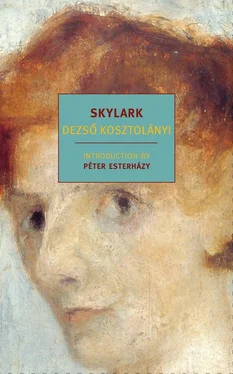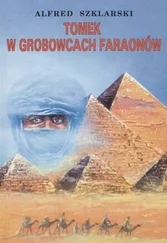He got in with an altogether different crowd, a handful of junior clerks, shady office boys, well below even his social station although close to him in spirit. Consequently, he felt ashamed of his friends, rather as a man who knows he has married beneath himself might feel ashamed of his wife. They met secretly in their lodgings, scoffing at everything, disparaging everyone, especially one another. An amber-tipped cigarette holder or a silver cigarette case could fill them with such unspeakable envy, and the good fortune of one of their number with such loathing, that they would immediately conspire against him and (remaining within the bounds of friendship, of course) contemplate causing him fatal injury, denouncing him in an anonymous letter or simply wringing his neck.
Géza Cifra, who was not naturally inclined to such malevolence, occasionally felt disgusted by his companions. But not enough to break free of them, for, while they were held together in petty wickedness by the iron clasp of passion, he was bound to them through plain lack of cultivation. He simply enjoyed their schoolboy pranks and nasty jokes.
His friendship with the Vajkays gradually cooled. They would no more than exchange greetings and the odd polite word when, as now, their paths occasionally crossed.
Skylark never mentioned Géza Cifra. There had, after all, been others like him. Her parents, however, had never forgotten the boy. Géza Cifra was the one person in all the world they could never forgive and would never cease to resent. What sin, what crime had he committed? None, to be sure. He had never laid a finger on their daughter, never led her on or deceived her, never made improper suggestions as others had.
All that had happened, one fine March evening during the first year of their acquaintance some nine years before, was that Géza Cifra had bumped into Skylark in front of the King of Hungary restaurant and had, out of simple courtesy, escorted her as far as the Baross Café, talking on the way about the weather, good and bad, causing Skylark, to her parents’ complete surprise, to arrive five minutes late for supper, which began, as custom had it, at approximately eight o'clock.
This the Vajkays could never forget. Years later they would still reflect on their daughter's mysterious evening promenade, and Géza Cifra became a kind of family legend, swelling inside them entirely unnourished by fact. At times they despised him, at times they accused him, and at times he was simply that spineless scoundrel, that shamefully unfeeling libertine, that wretched — if not altogether ill-intentioned — weakling of a young man, to whom between themselves they only ever referred as him . They never so much as uttered his name.
He had at one time undoubtedly met with the Vajkays’ highest approval. They could never have wished their daughter a more appropriate suitor. They had always dreamed of a decent, homely type who'd wear unironed broadcloth trousers and a painfully knitted brow; who'd sweat a little and blush when he spoke.
Géza Cifra was just such a man.
He was always embarrassed and ill at ease. Uncomfortable in the company of people brighter than himself, he could not disguise his torment. It hurt to look at him.
He was terrified of everyone and everything. Terrified of arriving too early or of leaving too late; terrified of talking too much or too little, of eating too much or too little. At dinner he would always refuse something twice before accepting it the third time round, his head tilted to one side, wearing a sheepish smile. Even now he did not know what to do.
He could never have imagined what he meant to that poor old couple. All he could sense was that they were colder towards him now, and this he found quite natural. Should he approach them or not?
He was tempted above all to disappear without seeming to notice them. Indeed he resolved to do so at once. Then, thinking how impolite that might seem, how scandalous and ungrateful, he grew alarmed by his own intentions and changed his mind. In the end, he did what he always did in such situations: the opposite of what he'd initially intended.
He walked over to them.
When Géza Cifra raised a gloved hand to his cap and greeted them, Ákos, still standing firm beside his wife, felt a shiver run down his spine.
“Gone away?” asked Géza Cifra.
“Away,” Father echoed hoarsely.
At this point the conversation stalled. It was the moment Géza Cifra always dreaded.
“Actually,” he began, without knowing how to continue. With that and similar words he tried to stop the gaps in the conversation, but to no avail. He smiled, then grimaced. He shivered hot and cold, then swallowed hard. He thought he had tarried long enough, then decided that he hadn't and it would still be improper to withdraw. His Adam's apple slid up and down his goitrous throat.
He cast a flustered glance at his pocket watch.
“Two forty-seven,” he said, taking refuge in railway talk. “Should get in at five twenty.”
Father made no reply, but Mother smiled. A warm, familiar smile, imploring him to stay, as it often had in times long since gone by.
“The train won't be late?” she inquired.
“No,” Géza Cifra replied.
Now he felt sure he could retire. He wanted to salute, but only managed a modest tip of the cap.
The elderly couple made their way out of the station.
A long afternoon lay before them, and, not knowing what else to do, they headed back to the house. They even hurried a little, as if something still awaited them at home.
Ákos had left the county administration some five years previously, taking early retirement on account of his illness. His days passed quietly, melting into months and years. Almost unawares, he had reached the age of fifty-nine. He looked a good deal older, sixty-five at least.
Before retiring he had bought the single-storey house on Petőfi Street from the remains of an inheritance left him by his maternal uncle, Gedeon Körcsy, together with the few odd pennies he had scraped together during his career. Apart from the house, he owned nothing else in the world. Here he would pace up and down, hands behind his back, growing weary of doing nothing. He'd wait for his wife and daughter to get up in the morning, then wait for them to go to bed in the evening. He waited for the table to be laid, then waited to see it cleared again. He pottered about restlessly with an anxious glow in his eyes.
He had not moved in society for years. He neither drank nor smoked. Not only his family doctor, Dr Gál, but also the professor he had consulted in Pest, had warned against arteriosclerosis and forbidden him from taking alcohol and — more distressingly — from smoking his beloved cigars.
The only passion remaining to him from the past was to sit in his cramped and perpetually damp study, leafing through a volume of Iván Nagy's great tome on Hungarian noble families, or Géza Csegheő's precious and thoroughly entertaining little book on the history of coats of arms. He knew a thing or two about heraldry and blazonry, archivology and sigillography, diplomatics and sphragistics. He'd sit and syllabise endless Latin letters of foundation— litterae armales —written by ancient kings, and never came across a single document, a single subpoenal executionale or capitulary fassio , on which he could not immediately shed some light. He saw at a glance how the various families branched out, and could at once divine the meaning of a horizontal bar in the panel of a crest, an eagle with spread wings, a solitary golden globe. And he loved his vocation dearly. The sheer delight of peering through the magnifying glass at a mouse bite, a moth hole or the zigzag channel carved by a woodworm, while breathing in the acerbic fragrance of the mould. It was here he came alive; here in the past. And as others travel miles to visit fortune-tellers, distinguished gentlemen from far-away counties had for many years made pilgrimages to Petőfi Street to discover their pasts.
Читать дальше












